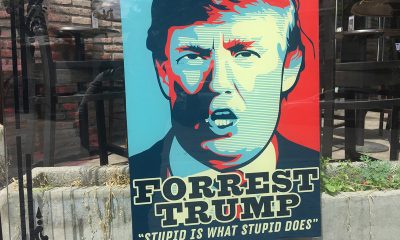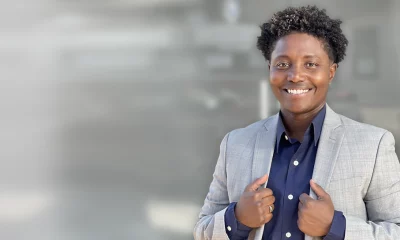Los Angeles
WeHo Iranian-American lesbian reacts to U.S.-Iran conflict
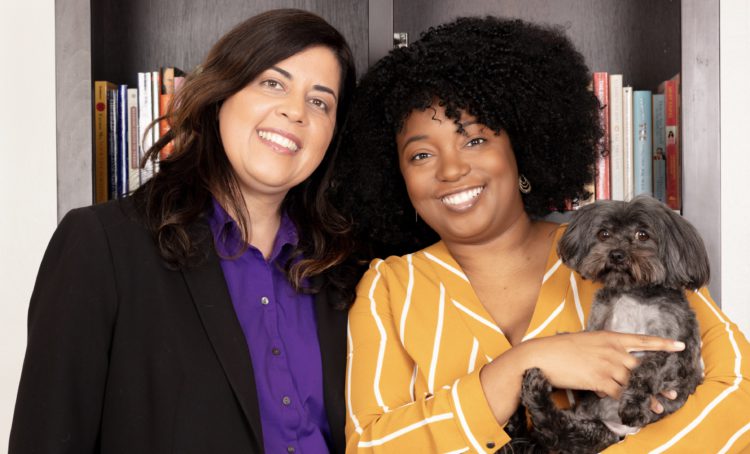
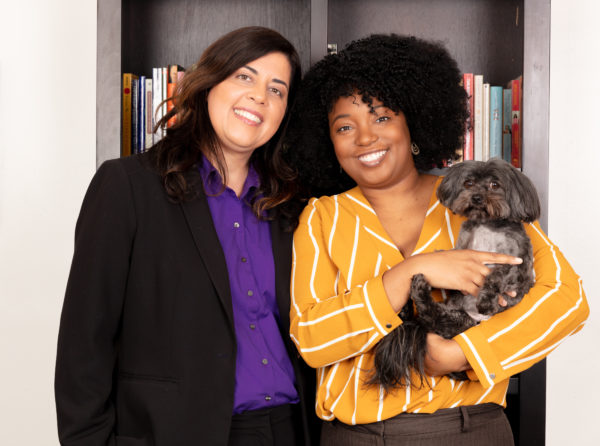
For a few moments on Wednesday, Jan. 8, the world held its collective breath waiting to see if the president of the United States would declare war on Iran. For days on Twitter, Donald Trump seemed to be craving a fight like a junkie needing a fix, itching to show the world yet again that he is better and way more macho than Barack Obama. After all, he ordered the drone strike assassination of Iranian bad guy Gen. Qassim Soleimani, something even the Israelis declined to do, fearing unpredictable and uncontrollable repercussions.
Trump entered the White House room for his global address backlit by a blinding white light as if his entrance was stage-produced by Evangelicals. And then, flanked by Vice President Pence and stone-faced generals, Trump breathed heavily through a scripted speech filled with lies and mispronounced words, showcasing his braggadocio – but stepping back from the brink of war. Trump claimed he was taking an “off-ramp” because Iran’s retaliation for the assassination of their number two leader was only two dozen ballistic missiles fired at two U.S. bases in Iraq, destroying nothing and killing no Americans. More economic sanctions, but no more military action, for now, at least.
“I feel relieved that there were no casualties and it seems that sanctions is the option being chosen today rather than a military option,” West Hollywood-based Iranian-American lesbian attorney Sepi Shyne tells the Los Angeles Blade after the speech. “I found his speech to be a political one more so than addressing the situation. It feels to me that the [Iranian Islamic] mullahs have been strengthened in this situation more than anything, which is not good for the people of Iran who want to be free of this oppressive regime.”
Like Shyne, the world exhaled when Trump exited back into the glaring bright light. “But analysts cautioned,” Peter Baker wrote in the New York Times, “that even if the two sides ease off a military clash in the short term, the conflict could very well play out in other ways in the weeks and months to come. Iran has many proxy groups in the Middle East that could stir trouble in new ways for American troops or American allies like Israel and Saudi Arabia, and experts remained wary of a possible Iranian cyberstrike on domestic facilities.”
This is no joke. Axios reports that there are nearly 800 US military bases around the world with between 60,000 and 70,000 US troops stationed throughout the Middle East. Soleimani’s assassination was Trump’s knee-jerk response while on holiday at Mar-a-Lago to seeing a mob protesting at the U.S. embassy in Iraq and fearing he’d be blamed for another Benghazi debacle.
But Trump’s impetuous ordering of the assassination without publicly providing evidence of its necessity has now united previous enemies Iran and Iraq against the U.S. And while the leaders of those countries might prefer stealthy long-term revenge, an organized affiliate like Hezbollah or a sympathetic lone wolf in America might not be so assuaged.
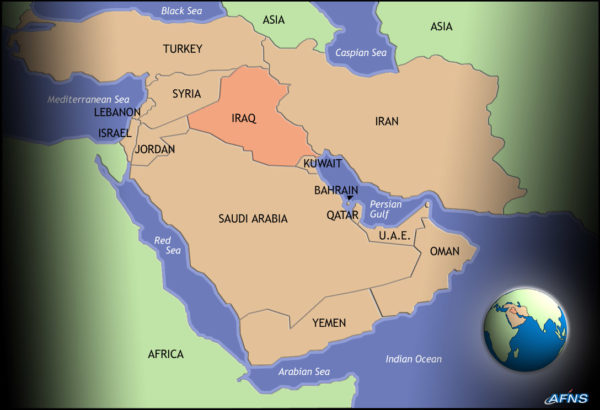
US military map of the region
Dread hangs like a heavy pall over much of America, including the families of LGBTQ members of an already weary volunteer military.
“Many of our military families are expressing a real sense of tiredness, dread, and sadness over the latest developments in the Middle East,” Stephen L. Peters II, a Marine veteran and Director of Communications and Marketing for Modern Military Association of America, tells the Los Angeles Blade. “While they continue to dig down deep to find what it takes to support their servicemembers through deployment after deployment, there’s no denying the seemingly endless conflicts are taking their toll. MMAA is working harder than ever to ensure these military families have the support system they desperately need, and we urge every American to show their appreciation however possible, regardless of their political persuasions.”
Waiting during the drums of war is dangerous for LGBTQ people.
“War would stoke nationalist fervor in both the U.S. and Iran, exactly the kind of populism that is so dangerous for those of us seen as different,” Jessica Stern, executive director of OutRight Action International,” tells the Los Angeles Blade. “In times of war, majorities scapegoat minorities, and the result is increased verbal and physical hatred toward those of us who are LGBTIQ, women, people of color, immigrant, or members of religious or ethnic minorities. Outright Action International opposes violence in all forms and strongly denounces US aggression towards Iran.”
Fear is palpable in the LGBTQ Iranian-American community in Los Angeles, too. The Los Angeles Blade has heard unconfirmed reports that LGBTQ Iranians have been reaching out for help from inside Iran and elsewhere. Additionally, some local LGBTQ Iranian Americans are fearful of talking to the press or being out and visible to anyone other than their immediate social circle for fear of repercussions here and abroad — a situation that has only intensified since the assassination. Some cite news reports of as many as 60 Iranian and Iranian-American U.S. citizens detained and questioned for up to 12 hours by federal officials at the U.S.-Canada border.
The Persian/Iranian community in Los Angeles grew dramatically after the fall of the modern but despotic Shah of Iran and the coming to power of the Islamic Revolutionary Guard, symbolized globally by the taking of American hostages in 1979. Since then the image of Iranian-Americans has fluctuated between being construed as Middle Eastern sleeper-cell terrorists after 9/11 (hence Trump’s Muslim ban) to being gaudy rich and overly self-absorbed as represented by Bravo’s “Shahs of Sunset,” including mustachioed gay Reza Farahan.
Attorney Sepi Shyne, 42, a former and current candidate for West Hollywood City Council, has a unique perspective on the conflict. Born in Iran in 1977, a year before the Iran-Iraq War started, her father worked for the government-run oil company but supported pro-Western Shah Mohammad Reza Pahlavi, as did Shyne’s feminist mother.
Her father “was thrown in jail for a while because he spoke up against the mullahs. After that, we fled the country for our safety,” Shyne says. “My mom is such a feminist. In fact, she’s on Facebook with 5,000 friends, constantly posting in Farsi against the Islamic regime and giving inspiration to the women in Iran who are still really treated horribly under this regime.”
People have misconceptions about Iran. “It is very metropolitan” with “a lot of cultural sites because we do have so much history there.” But “people haven’t been happy with the regime … We’ve heard from family that hundreds and hundreds of people were shot dead” during the recent protests against the regime.
“Unfortunately, this act of killing Soleimani, as much as the anti-Islamic regime Iranians are happy that the guy has been killed because, finally, there’s some act against this regime,” she says. But “it seems like people now in Iran are becoming united against a common enemy, which is now the Trump administration.” On the other hand, Soleimani also kept ISIS out of Iran “and ISIS has been a nightmare for the Middle Eastern countries. It’s a really bad situation.”
After moving to the U.S. in 1982, Shyne experienced “regular bullying,” because she looked different from other kids at school. But the hostage crisis in Iran raised the bullying to a more intense level. “They started saying I’m a camel and all this race-related bullying,” she says. “My family and friends were very scared. Iranian college kids were threatened and had hate crimes committed against them.”
A similar fear is gripping Iranian-Americans now as hate crimes have increased because of an administration “that just tramples on people’s rights. We’ve seen it for three years now with every single group. We call Los Angeles ‘Tehrangeles’ because of the huge amount of Iranians that moved to Los Angeles as a result of the diaspora” who are concerned now about the extreme, volatile Trumpers.
“[Trump] leads with so much hate, that it elevates and stokes the anger in other people. And now we’ve had three anti-Semitic acts of violence in Los Angeles during the holidays. We had the attack on the Persian temple in Beverly Hills and two stores in West Hollywood, the Bayou and Block Party, got vandalized.
“I know that the LGBTQ community and the Jewish community have high rates of hate crimes against them, but these are just so blatant,” she says. “I never thought I would see this again. And so when Trump ordered the attack on Soleimani, the first thing I thought was, ‘Oh, my God, here we go.’”
Shyne thinks Trump might start a war just to distract from his impeachment. “I do believe he truly believes that’s the way to win reelection and, sadly, most presidents do when we’re in a time of war, so that’s even scarier,” she says.
As Middle Easterners during these times of conflict, “what usually happens is anyone who looks brown ends up being targets,” like Sikhs after 9/11. “I started carrying my passport in my backpack when they were throwing people in cages and separating children….I was so scared because if, for some reason, I can’t prove I’m a U.S. citizen and, in the chaotic government that we have right now, God forbid I get deported to Iran. I’m sure my name is on a list as a lesbian. I’m a very, very out….My mom is absolutely on a list because they monitor social media, the Iranian Islamic agency….I’m so visible, I can never go back to Iran because they would absolutely throw me in jail and then kill me.”
Other visible LGBTQ people have been targeted on social media, Shyne says.
But there has also been a lot more acceptance for LGBTQ Iranians in Los Angeles, she says, at least in the Jewish community. Shyne cites organizations like JQ (Jewish Queer) International that have done “an incredible job to educate the community,” though a lot of Iranians live in Northern California with no such organization as JQ.
“I’m not Jewish. I was born Muslim, but I’m nondenominational. I’m spiritual,” Shyne says. “But JQ was the first queer organization that had an Iranian focus as part of one of its queer Iranian programming that I ever found out about, so I thought it was pretty cool.” It also has an Iranian version of PFLAG, which is “very important.”
Shyne also notes another, newer nondenominational Iranian LGBTQ organization called RAHA International that also has a lot of programming, not just social events, for queer Iranians.
Shyne notes how essential it is for LGBTQ Iranians to support each other.
“Even [former Iranian President Mahmoud] Ahmadinejad said, ‘We don’t have gay people in Iran.’ That’s the culture. They erase us,” Shyne says. “I came out when I was 19 to my mom and my family and I was the first ever out Iranian to come out to any of our family. It was very hard — it took about 10 years. And slowly, they went from tolerating to accepting and eventually, they’re all advocates now for the community, which is amazing.
“I knew the shift happened when they started coming out for the family to other people,” she says. “My brother was like, ‘Oh, my sister is a lesbian’ to people. I thought, ‘Oh, great. This is it. This is the goal.’ This is when you know, ‘okay, my work has been done now.’ But there are a lot of Iranians that still are in the closet. They’re afraid to come out because some of them travel back and forth. They maybe feel a little more free — but they’re still not out because they want to go back to Iran to visit their family and their loved ones and they love their country. They don’t want to give up the right to go back to Iran by coming out and putting themselves in danger.”
LGBTQ Iranian-Americans face a double concern in the U.S. conflict with Iran – being targeted for hate crimes here and fear of deportation and being killed in Iran.
Shyne said she saw the fear intensify during the Muslim travel ban. “What I was concerned about were the LGBTQ people being stuck in Iran and not being able to travel here” she says. “I was also thinking about all of the dictators in power in other countries and there are so many of them right now, way too many.”
But Shyne is also concerned about the dramatic increase in hate crimes in LA County. “I’m definitely concerned about hate crimes because the MAGA group of Trump supporters thrive on his words and his words are very dangerous. And Trump has made Middle Easterners an ‘enemy’ in the media because of all the wars we’ve been in,” Shyne says. “And now we’re at war again, pretty much.”
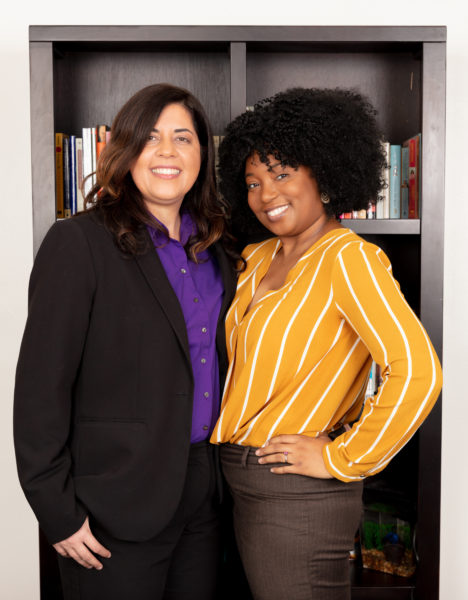 Sepi and Ashlei Shyne (Photo courtesy Shyne)
Sepi and Ashlei Shyne (Photo courtesy Shyne)
The concern is a family affair. Shyne is married to actress/writer Ashlei Shyne with whom she shares a dog named Chloe and three cats, Imon and Ameera that are Siamese twins, and Bastet, who is going to be 18 on March 3rd.
Ashlei Shyne has “a lot of concerns” primarily related to Sepi Shyne’s political visibility after she received numerous anti-Muslim comments.
“This is definitely a concern,” Shyne says. “But, for me, I think it’s more important to be courageous and stand up because I’m not the Iranian or the Middle Easterner that is what everybody thinks, right? I’m an out, liberal, lesbian, born-Muslim Iranian who is very spiritual.”
And spirited. Shyne says she became an attorney after experiencing the humiliation of discrimination while in college.
“My ex and I were holding hands at a coffee shop that was known to be gay-friendly in San Jose. The management had changed and the new manager was homophobic,” she says. “Next thing I know, a police officer and the manager were standing above us. The police officer looks down and says, ‘You two need to get up and leave. The management doesn’t want your kind in this establishment.’ Then cop blew a kiss and winked. We were terrified and we couldn’t call our family because we had just come out recently, so they weren’t going to be happy. We decided right then and there that we would go to law school, learn the law, and stop things like this from happening to others.”
But being an attorney is no guard against retaliatory terrorism. “I was actually fearful about the Women’s March that’s happening — but we do have a lot of domestic white terrorists in America,” says Shyne, adding that the “pretty savvy” Iranian government would more likely “target Trump properties to get back at him.”
Of continuing great concern, however, is how Iranian-Americans are perceived and treated. “If you see somebody being targeted, speak up. If you see a hate crime happening, try to help and intervene,” Shyne says. “The people of Iran do not hate America. Those people in the streets are the very conservative Islamic people. The majority of the people were the ones protesting that were shot and killed — 1,000 of them — by this government. It’s a delicate situation, but most Iranians don’t want this regime in power.”
Los Angeles
Los Angeles Blade names new publisher
Alexander Rodriguez brings deep media, business experience to outlet
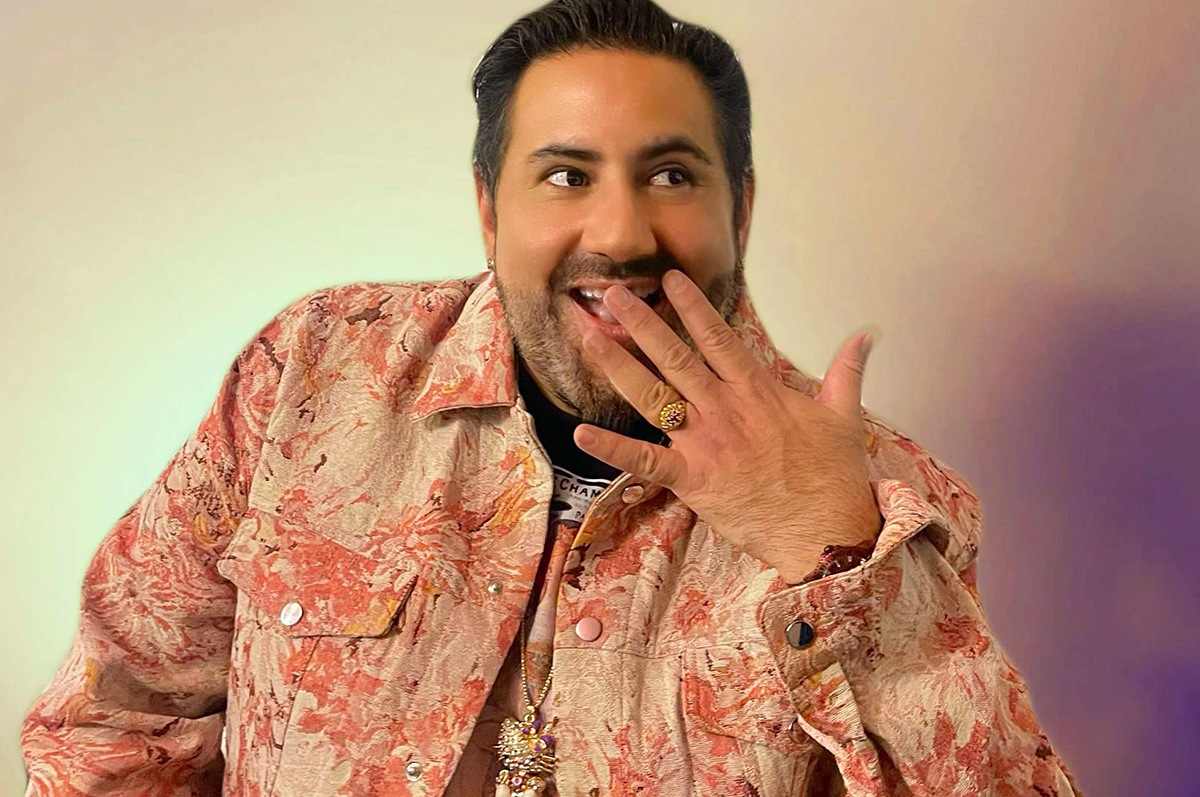
The Los Angeles Blade, Southern California’s leading LGBTQ news outlet, today announced the appointment of a new publisher, Alexander Rodriguez.
Rodriguez has a long background in queer media, business development, and a deep commitment to the Los Angeles community. He has worked as a lead writer and podcast host for Metrosource Magazine and for GED Magazine; content director for FleshBot Gay; and as host and producer for the “On the Rocks” podcast. On the business side, Rodriguez spent years working in business development in the banking industry throughout Los Angeles. He also has an extensive background in event planning and management and has served on the boards of many LGBTQ non-profits. As a TV and radio personality, he has served as emcee for LGBTQ events around the nation.
“I’m excited to bring my diverse media and business experience to the Los Angeles Blade,” Rodriguez said. “We will continue the Blade’s mission of serving as our community’s news outlet of record during these challenging times and work toward building bridges within our community and beyond.”
Rodriguez starts in his new role on Monday, Feb. 3.
“We are thrilled to welcome Alexander to the Blade team,” said Kevin Naff, one of the owners of the Los Angeles Blade. “His multimedia and business side experience will help us grow the Blade in L.A. and continue our commitment to best-in-class journalism serving the LGBTQ community in Southern California.”
Rodriguez becomes the Los Angeles Blade’s second publisher following the unexpected death of founding publisher Troy Masters in December. Masters served in the role for nearly eight years. The community will come together for a celebration of Masters’s life on Monday, Feb. 10, 7-9 p.m. at the Abbey.
“Troy’s legacy is in good hands with Alexander at the helm alongside our new local news editor, Gisselle Palomera,” Naff added.
The Los Angeles Blade, launched in 2017, celebrates its eighth anniversary in March. It is the sister publication of the Washington Blade, founded in 1969, which offers unmatched coverage of queer political news and is the only LGBTQ outlet in the White House press pool and the White House Correspondents’ Association, and the only LGBTQ outlet with a dedicated seat in the White House briefing room.
Alexander Rodriguez can be reached at [email protected].
Los Angeles
Broadway Cares/Equity Fights AIDS donates $500K to wildfire relief effort
Four local organizations received emergency grants

Broadway Cares/Equity Fights AIDS on Monday announced it has awarded $500,000 in emergency grants to organizations that are responding to the Los Angeles wildfires.
A press release notes the Entertainment Community Fund received $250,000, the California Fire Foundation Wildfire and Disaster Relief Fund received $100,000, the Los Angeles Regional Food Bank received $100,000, and Project Angel Food received $50,000.
“All of these organizations are providing much-needed, on-the-ground support for residents and first responders,” said Broadway Cares/Equity Fights AIDS.
“Our compassionate community knows the power of coming together in times of need,” added Broadway Cares Executive Director Danny Whitman. “Because of the generosity of the theater community — those onstage, backstage and in the audience — these emergency grants will immediately provide meals, shelter, medical care, clothing and emergency financial assistance, all first steps on the long road toward recovering, rebuilding, and healing.”
Los Angeles
The dedicated life and tragic death of gay publisher Troy Masters
‘Always working to bring awareness to causes larger than himself’

Troy Masters was a cheerleader. When my name was called as the Los Angeles Press Club’s Print Journalist of the Year for 2020, Troy leapt out of his seat with a whoop and an almost jazz-hand enthusiasm, thrilled that the mainstream audience attending the Southern California Journalism Awards gala that October night in 2021 recognized the value of the LGBTQ community’s Los Angeles Blade.
That joy has been extinguished. On Wednesday, Dec. 11, after frantic unanswered calls from his sister Tammy late Monday and Tuesday, Troy’s longtime friend and former partner Arturo Jiminez did a wellness check at Troy’s L.A. apartment and found him dead, with his beloved dog Cody quietly alive by his side. The L.A. Coroner determined Troy Masters died by suicide. No note was recovered. He was 63.
Considered smart, charming, committed to LGBTQ people and the LGBTQ press, Troy’s inexplicable suicide shook everyone, even those with whom he sometimes clashed.
Troy’s sister and mother – to whom he was absolutely devoted – are devastated. “We are still trying to navigate our lives without our precious brother/son. I want the world to know that Troy was loved and we always tried to let him know that,” says younger sister Tammy Masters.
Tammy was 16 when she discovered Troy was gay and outed him to their mother. A “busy-body sister,” Tammy picked up the phone at their Tennessee home and heard Troy talking with his college boyfriend. She confronted him and he begged her not to tell.
“Of course, I ran and told Mom,” Tammy says, chuckling during the phone call. “But she – like all mothers – knew it. She knew it from an early age but loved him unconditionally; 1979 was a time [in the Deep South] when this just was not spoken of. But that didn’t stop Mom from being in his corner.”
Mom even marched with Troy in his first Gay Pride Parade in New York City. “Mom said to him, ‘Oh, my! All these handsome men and not one of them has given me a second look! They are too busy checking each other out!” Tammy says, bursting into laughter. “Troy and my mother had that kind of understanding that she would always be there and always have his back!
“As for me,” she continues, “I have lost the brother that I used to fight for in any given situation. And I will continue to honor his cause and lifetime commitment to the rights and freedom for the LGBTQ community!”
Tammy adds: “The outpouring of love has been comforting at this difficult time and we thank all of you!”
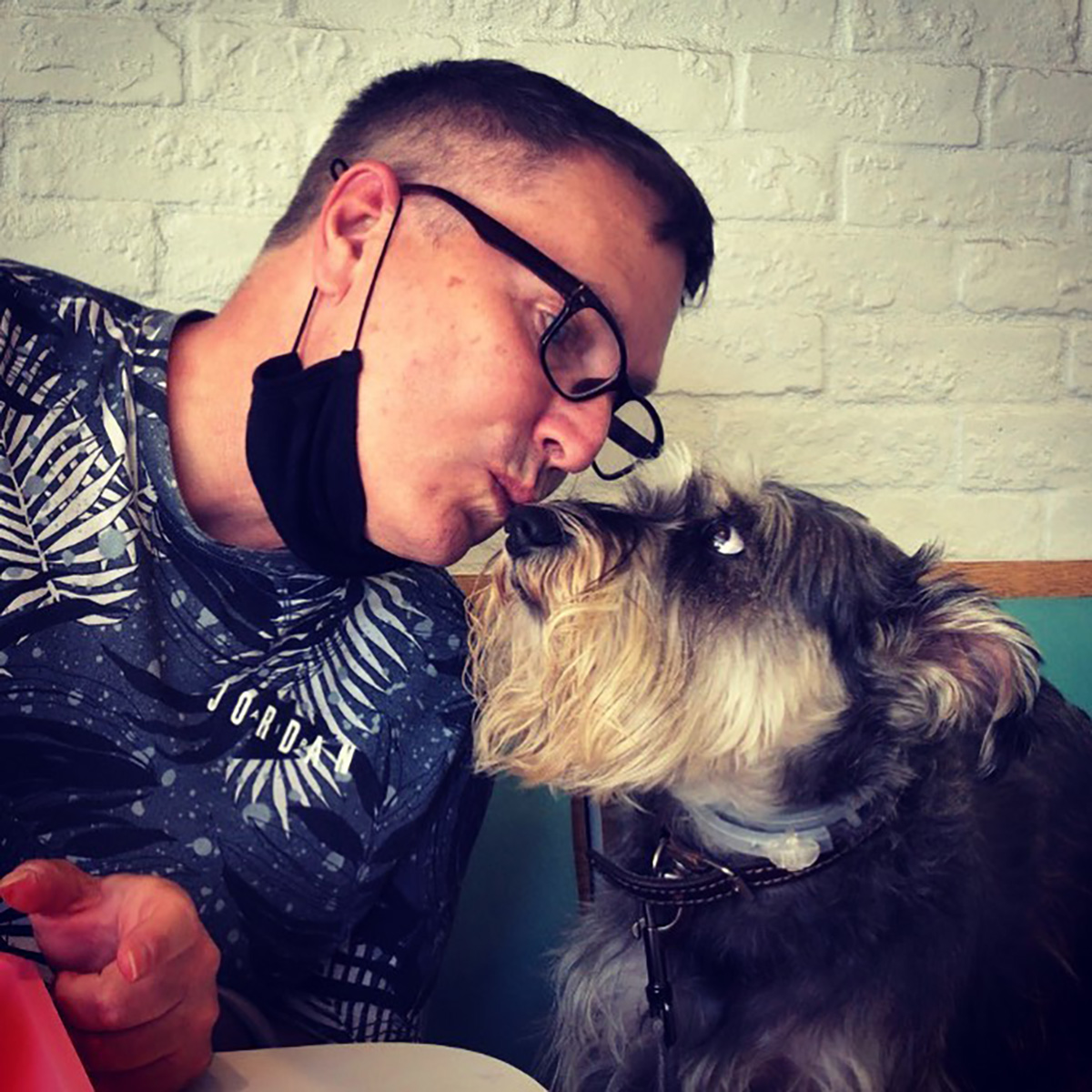
No one yet knows why Troy took his life. We may never know. But Troy and I often shared our deeply disturbing bouts with drowning depression. Waves would inexplicitly come upon us, triggered by sadness or an image or a thought we’d let get mangled in our unresolved, inescapable past trauma.
We survived because we shared our pain without judgment or shame. We may have argued – but in this, we trusted each other. We set everything else aside and respectfully, actively listened to the words and the pain within the words.
Listening, Indian philosopher Krishnamurti once said, is an act of love. And we practiced listening. We sought stories that led to laughter. That was the rope ladder out of the dark rabbit hole with its bottomless pit of bullying and endless suffering. Rung by rung, we’d talk and laugh and gripe about our beloved dogs.
I shared my 12 Step mantra when I got clean and sober: I will not drink, use or kill myself one minute at a time. A suicide survivor, I sought help and I urged him to seek help, too, since I was only a loving friend – and sometimes that’s not enough.
(If you need help, please reach out to talk with someone: call or text 988 Suicide and Crisis Lifeline. They also have services in Spanish and for the deaf.)
In 2015, Troy wrote a personal essay for Gay City News about his idyllic childhood in the 1960s with his sister in Nashville, where his stepfather was a prominent musician. The people he met “taught me a lot about having a mission in life.”
During summers, they went to Dothan, Ala., to hang out with his stepfather’s mother, Granny Alabama. But Troy learned about “adult conversation — often filled with derogatory expletives about Blacks and Jews” and felt “my safety there was fragile.”
It was a harsh revelation. “‘Troy is a queer,’ I overheard my stepfather say with energetic disgust to another family member,” Troy wrote. “Even at 13, I understood that my feelings for other boys were supposed to be secret. Now I knew terror. What my stepfather said humiliated me, sending an icy panic through my body that changed my demeanor and ruined my confidence. For the first time in my life, I felt depression and I became painfully shy. Alabama became a place, not of love, not of shelter, not of the magic of family, but of fear.”
At the public pool, “kids would scream, ‘faggot,’ ‘queer,’ ‘chicken,’ ‘homo,’ as they tried to dunk my head under the water. At one point, a big crowd joined in –– including kids I had known all my life –– and I was terrified they were trying to drown me.
“My depression became dangerous and I remember thinking of ways to hurt myself,” Troy wrote.
But Troy Masters — who left home at 17 and graduated from the University of Tennessee at Knoxville — focused on creating a life that prioritized being of service to his own intersectional LGBTQ people. He also practiced compassion and last August, Troy reached out to his dying stepfather. A 45-minute Facetime farewell turned into a lovefest of forgiveness and reconciliation.
Troy discovered his advocacy chops as an ad representative at the daring gay and lesbian activist publication Outweek from 1989 to 1991.
“We had no idea that hiring him would change someone’s life, its trajectory and create a lifelong commitment” to the LGBTQ press, says Outweek’s co-founder and former editor-in-chief Gabriel Rotello, now a TV producer. “He was great – always a pleasure to work with. He had very little drama – and there was a lot of drama at Outweek. It was a tumultuous time and I tended to hire people because of their activism,” including Michelangelo Signorile, Masha Gessen, and Sarah Pettit.
Rotello speculates that because Troy “knew what he was doing” in a difficult profession, he was determined to launch his own publication when Outweek folded. “I’ve always been very happy it happened that way for Troy,” Rotello says. “It was a cool thing.”
Troy and friends launched NYQ, renamed QW, funded by record producer and ACT UP supporter Bill Chafin. QW (QueerWeek) was the first glossy gay and lesbian magazine published in New York City featuring news, culture, and events. It lasted for 18 months until Chafin died of AIDS in 1992 at age 35.
The horrific Second Wave of AIDS was peaking in 1992 but New Yorkers had no gay news source to provide reliable information at the epicenter of the epidemic.
“When my business partner died of AIDS and I had to close shop, I was left hopeless and severely depressed while the epidemic raged around me. I was barely functioning,” Troy told VoyageLA in 2018. “But one day, a friend in Moscow, Masha Gessen, urged me to get off my back and get busy; New York’s LGBT community was suffering an urgent health care crisis, fighting for basic legal rights and against an increase in violence. That, she said, was not nothing and I needed to get back in the game.”
It took Troy about two years to launch the bi-weekly newspaper LGNY (Lesbian and Gay New York) out of his East Village apartment. The newspaper ran from 1994 to 2002 when it was re-launched as Gay City News with Paul Schindler as co-founder and Troy’s editor-in-chief for 20 years.

“We were always in total agreement that the work we were doing was important and that any story we delved into had to be done right,” Schindler wrote in Gay City News.
Though the two “sometimes famously crossed swords,” Troy’s sudden death has special meaning for Schindler. “I will always remember Troy’s sweetness and gentleness. Five days before his death, he texted me birthday wishes with the tag, ‘I hope you get a meaningful spanking today.’ That devilishness stays with me.”
Troy had “very high EI (Emotional Intelligence), Schindler says in a phone call. “He had so much insight into me. It was something he had about a lot of people – what kind of person they were; what they were really saying.”
Troy was also very mischievous. Schindler recounts a time when the two met a very important person in the newspaper business and Troy said something provocative. “I held my breath,” Schindler says. “But it worked. It was an icebreaker. He had the ability to connect quickly.”
The journalistic standard at LGNY and Gay City News was not a question of “objectivity” but fairness. “We’re pro-gay,” Schindler says, quoting Andy Humm. “Our reporting is clear advocacy yet I think we were viewed in New York as an honest broker.”
Schindler thinks Troy’s move to Los Angeles to jump-start his entrepreneurial spirit and reconnect with Arturo, who was already in L.A., was risky. “He was over 50,” Schindler says. “I was surprised and disappointed to lose a colleague – but he was always surprising.”
“In many ways, crossing the continent and starting a print newspaper venture in this digitally obsessed era was a high-wire, counter-intuitive decision,” Troy told VoyageLA. “But I have been relentlessly determined and absolutely confident that my decades of experience make me uniquely positioned to do this.”
Troy launched The Pride L.A. as part of the Mirror Media Group, which publishes the Santa Monica Mirror and other Westside community papers. But on June 12, 2016, the day of the Pulse Nightclub shooting in Orlando, Fla., Troy said he found MAGA paraphernalia in a partner’s office. He immediately plotted his exit. On March 10, 2017, Troy and the “internationally respected” Washington Blade announced the launch of the Los Angeles Blade.

In a March 23, 2017 commentary promising a commitment to journalistic excellence, Troy wrote: “We are living in a paradigm shifting moment in real time. You can feel it. Sometimes it’s overwhelming. Sometimes it’s toxic. Sometimes it’s perplexing, even terrifying. On the other hand, sometimes it’s just downright exhilarating. This moment is a profound opportunity to reexamine our roots and jumpstart our passion for full equality.”
Troy tried hard to keep that commitment, including writing a personal essay to illustrate that LGBTQ people are part of the #MeToo movement. In “Ending a Long Silence,” Troy wrote about being raped at 14 or 15 by an Amtrak employee on “The Floridian” traveling from Dothan, Ala., to Nashville.
“What I thought was innocent and flirtatious affection quickly turned sexual and into a full-fledged rape,” Troy wrote. “I panicked as he undressed me, unable to yell out and frozen by fear. I was falling into a deepening shame that was almost like a dissociation, something I found myself doing in moments of childhood stress from that moment on. Occasionally, even now.”
From the personal to the political, Troy Masters tried to inform and inspire LGBTQ people.
Richard Zaldivar, founder and executive director of The Wall Las Memorias Project, enjoyed seeing Troy at President Biden’s Pride party at the White House.
“Just recently he invited us to participate with the LA Blade and other partners to support the LGBTQ forum on Asylum Seekers and Immigrants. He cared about underserved community. He explored LGBTQ who were ignored and forgotten. He wanted to end HIV; help support people living with HIV but most of all, he fought for justice,” Zaldivar says. “I am saddened by his loss. His voice will never be forgotten. We will remember him as an unsung hero. May he rest in peace in the hands of God.”
Troy often featured Bamby Salcedo, founder, president/CEO of TransLatina Coalition, and scores of other trans folks. In 2018, Bamby and Maria Roman graced the cover of the Transgender Rock the Vote edition.
“It pains me to know that my dear, beautiful and amazing friend Troy is no longer with us … He always gave me and many people light,” Salcedo says. “I know that we are living in dark times right now and we need to understand that our ancestors and transcestors are the one who are going to walk us through these dark times… See you on the other side, my dear and beautiful sibling in the struggle, Troy Masters.”
“Troy was immensely committed to covering stories from the LGBTQ community. Following his move to Los Angeles from New York, he became dedicated to featuring news from the City of West Hollywood in the Los Angeles Blade and we worked with him for many years,” says Joshua Schare, director of Communications for the City of West Hollywood, who knew Troy for 30 years, starting in 1994 as a college intern at OUT Magazine.
“Like so many of us at the City of West Hollywood and in the region’s LGBTQ community, I will miss him and his day-to-day impact on our community.”

“Troy Masters was a visionary, mentor, and advocate; however, the title I most associated with him was friend,” says West Hollywood Mayor John Erickson. “Troy was always a sense of light and working to bring awareness to issues and causes larger than himself. He was an advocate for so many and for me personally, not having him in the world makes it a little less bright. Rest in Power, Troy. We will continue to cause good trouble on your behalf.”
Erickson adjourned the WeHo City Council meeting on Monday in his memory.
Masters launched the Los Angeles Blade with his partners from the Washington Blade, Lynne Brown, Kevin Naff, and Brian Pitts, in 2017.
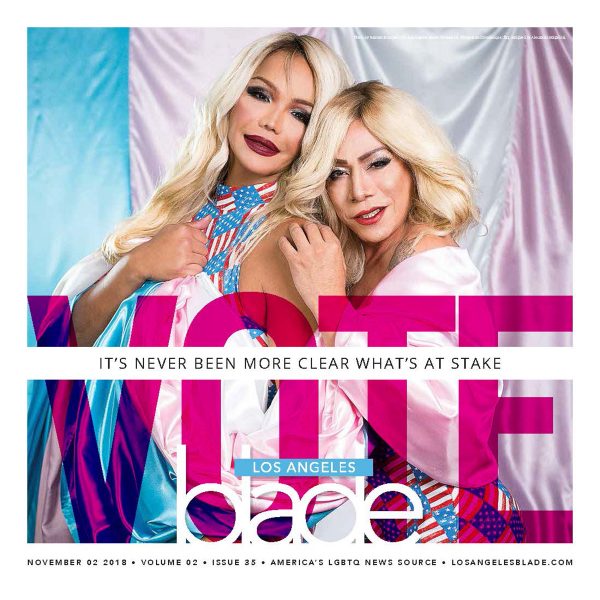
“Troy’s reputation in New York was well known and respected and we were so excited to start this new venture with him,” says Naff. “His passion and dedication to queer LA will be missed by so many. We will carry on the important work of the Los Angeles Blade — it’s part of his legacy and what he would want.”
AIDS Healthcare Foundation President Michael Weinstein, who collaborated with Troy on many projects, says he was “a champion of many things that are near and dear to our heart,” including “being in the forefront of alerting the community to the dangers of Mpox.”
“All of who he was creates a void that we all must try to fill,” Weinstein says. “His death by suicide reminds us that despite the many gains we have made, we’re not all right a lot of the time. The wounds that LGBT people have experienced throughout our lives are yet to be healed even as we face the political storm clouds ahead that will place even greater burdens on our psyches.”
May the memory and legacy of Troy Masters be a blessing.
Veteran LGBTQ journalist Karen Ocamb served as the news editor and reporter for the Los Angeles Blade.
Los Angeles
Los Angeles Blade publisher Troy Masters dies at 63
Longtime advocate for LGBTQ equality, queer journalism
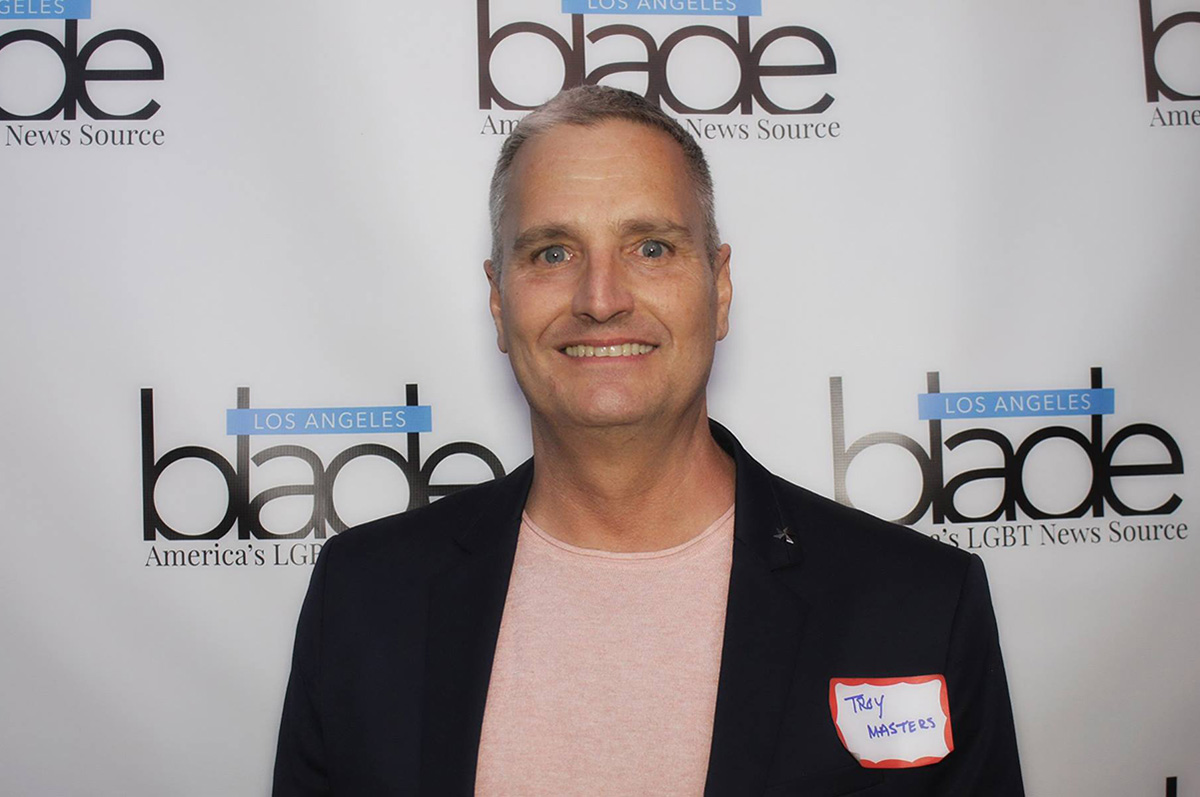
Troy Masters, publisher of the Los Angeles Blade, died unexpectedly on Wednesday Dec. 11, according to a family member. He was 63. The cause of death was not immediately released.
Masters is a well-respected and award-winning journalist and publisher with decades of experience, mostly in LGBTQ media. He founded Gay City News in New York City in 2002 and relocated to Los Angeles in 2015. In 2017, he became the founding publisher of the Los Angeles Blade, a sister publication of the Washington Blade, the nation’s oldest LGBTQ newspaper.
His family released a statement to the Blade on Thursday.
“We are shocked and devastated by the loss of Troy,” the statement says. “He was a tireless advocate for the LGBTQ community and leaves a tremendous legacy of fighting for social justice and equality. We ask for your prayers and for privacy as we mourn this unthinkable loss. We will announce details of a celebration of life in the near future.”
The Blade management team released the following statement on Thursday:
“All of us at the Los Angeles Blade and Washington Blade are heartbroken by the loss of our colleague. Troy Masters is a pioneer who championed LGBTQ rights as well as best-in-class journalism for our community. We will miss his passion and his tireless dedication to the Los Angeles queer community.
“We would like to thank the readers, advertisers, and supporters of the Los Angeles Blade, which will continue under the leadership of our local editor Gisselle Palomera, the entire Blade family in D.C. and L.A., and eventually under a new publisher.”
Troy Masters was born April 13, 1961 and is survived by his mother Josie Kirkland and his sister Tammy Masters, along with many friends and colleagues across the country. This is a developing story and will be updated as more details emerge.

Los Angeles
Ysabel Jurado claims victory: A new era for Los Angeles City Council District 14
The LGBTQ+ candidate maintained steady lead over incumbent Kevin De León, eventually declaring victory
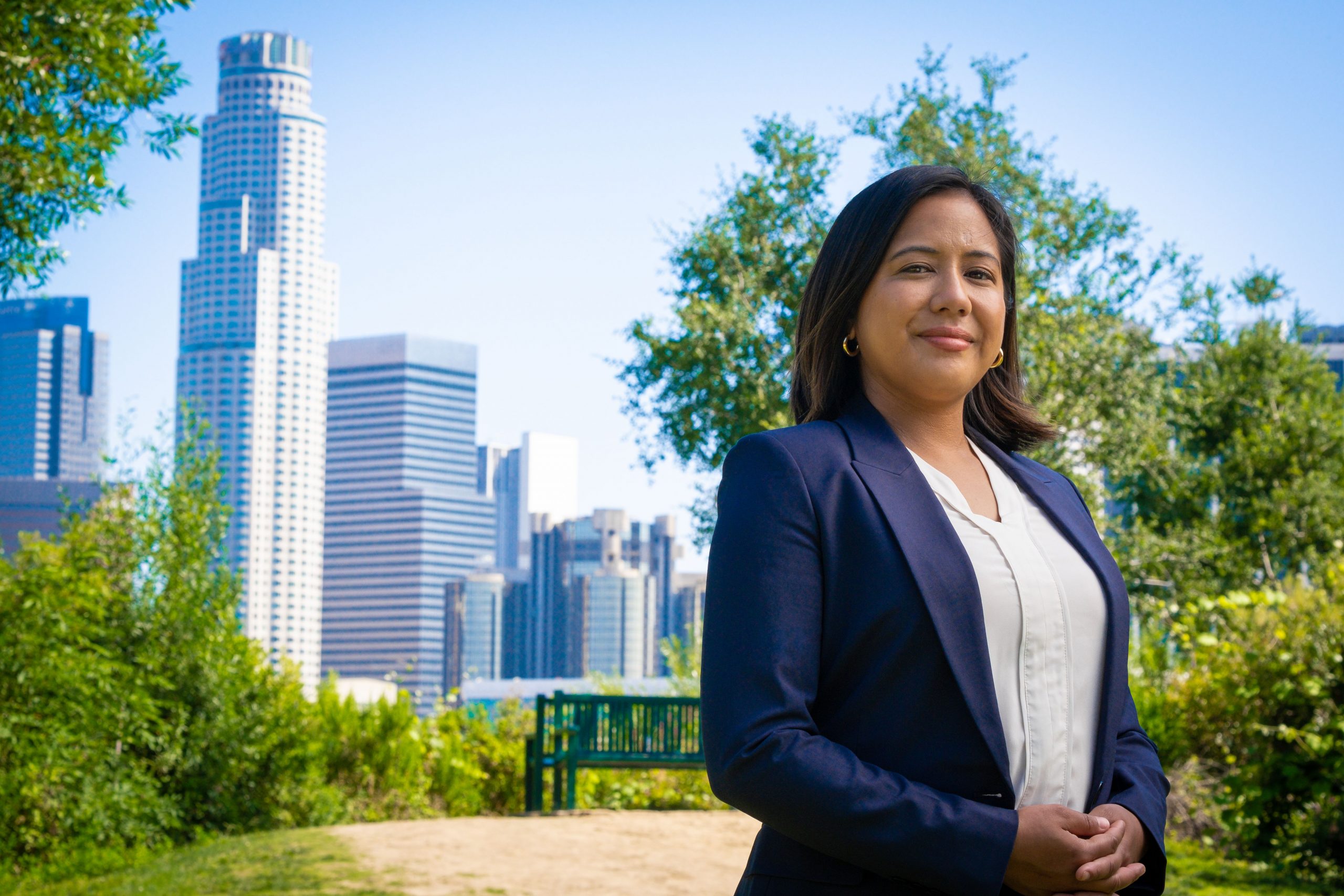
Ysabel Jurado, the Highland Park resident and tenants rights’ attorney, is now Councilmember of Council District 14 after a battle for the hot seat against incumbent Kevin De León.
“Today, I am humbled to officially declare victory in the race for Los Angeles City Council District 14. This win is not mine—it belongs to our community,” said Jurado shortly after the win was announced.
Jurado makes history as the first Filipino American to serve on the Council and has expanded LGBTQ+ and women’s representation too.
In her celebratory statement after Thursday’s win, she stated that De León used Trump-like tactics and she is glad the city did not play into it.
“Trumpism has no place in CD-14– and we proved that by resoundingly rejecting the divisive tactics deployed by our opponent–tactics adopted directly from the Trump playbook,” said Jurado. “Like Trump, our opponent thumbed his nose at the law—from his racist gerrymandering scandal that likely violated the Voting Rights Act– to the current open investigation into his campaign for money laundering.”
Jurado is the new hope for a city that has been marred by racial and phobic remarks by those previously and still in positions of power.
Other news outlets are reporting that this marks another fallen Latino leader after the leaked L.A. City Council audio recording went viral in 2021 and led to the resignation of Los Angeles City Council president Nury Martínez.
De León’s goal during his term was to retain and expand Latin American political power.
With De León out, that leaves Latin Americans taking up only four out of the Council’s 15 seats, in a city that has a majority Latin American population. The city’s biggest Mexican American communities like Boyle Heights and El Sereno will not have a Latin American leader for the first time in nearly 40 years.
During De León’s campaign, he urged voters that if Jurado were to be elected, it would come at the expense of Latin American voices.
Last month, Eastside voters received a text message from De León’s campaign saying: ‘Forty years of Latino political power is under threat.’
Jurado secured her victory after placing first in the March primary, with support from Latin American politicians like Councilmember Hugo Soto-Martínez, L.A. Unified School District trustee Rocio Rivas, L.A. County Supervisor Hilda Solis and Councilmember Eunisses Hernandez, who replaced incumbent Gil Cedillo after he was also caught on audio making racist and defamatory remarks.
“These are heavy times, but Ysabel Jurado’s win is an incredible cause for hope,” said Hernandez in a congratulatory post on Instagram. “She has proven again and again that our city has not just the capacity to dream of a better future for ourselves, but that we demand it.”
De León tapped into the pathos of Eastside residents during his campaign, resorting to political tactics that attacked Jurado directly, rather than tackling the key issues at hand.
“Like Trump, he relied upon fear mongering, red-baiting, misogyny, and racial dog-whistling in an effort to divide us. But unlike Trump, his tactics failed.”
Los Angeles
Los Angeles opens nation’s first transgender vote center
Activists, local officials attended opening
In a landmark development for electoral accessibility, Los Angeles County has opened the doors to the nation’s first general election Vote Center located within a transgender establishment. The Connie Norman Transgender Empowerment Center officially launched its voting facilities today, inviting the local trans community and all registered voters in Los Angeles County to participate in the democratic process.
The Vote Center at CONOTEC will operate for early voting from Nov. 2 – Nov. 5 from 8 a.m. to 8 p.m. Registered voters in Los Angeles County can cast their ballot at CONOTEC, regardless of their residential address. This initiative not only creates a safe and affirming space for marginalized voters but also aims to foster broader community engagement.
During the grand opening, Los Angles County Registrar Dean Logan and West Hollywood Mayor John Erickson, celebrated this significant moment.
Logan said, “The county and everyone in my office know that we need to make voting as accessible and welcoming as possible in every corner of the county. The CONOTEC leadership has done a great job preparing this Vote Center, and we thank them for opening their space to their community and all of the LA County residents who chose to vote here.”
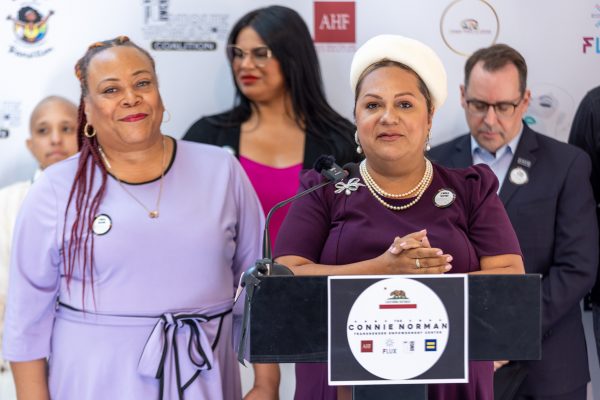
Queen Victoria Ortega (at podium), president of FLUX International, addressed the need for more action.
“We are tired of everyone discussing our safety while doing nothing about it. Now, we are taking matters into our own hands,” Ortega said. “We, the trans community, have created a safe space for the most marginalized to vote, and when you do that, you create a safe place for all. We are honored and duty-bound to be the first presidential election Vote Center in America at a transgender establishment.”
Queen Chela Demuir, executive director of the Unique Women’s Coalition, emphasized the historical legacy of trans rights activists.
“In the spirit of Marsha P. Johnson and Sylvia Rivera, we honor our transcestors and carry their legacy forward,” she said. “This voting center stands as a safe and welcoming space for our trans siblings, while also embracing all allies and residents of Los Angeles County. It’s a space where everyone’s voice matters, uplifting and empowering our community.”
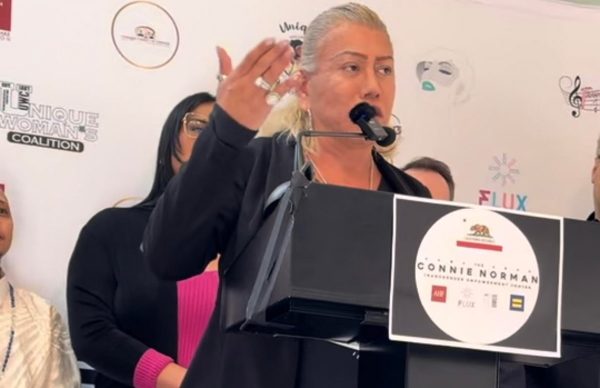
Bamby Salcedo, founder and CEO of the TransLatin@ Coalition. (Photo by Troy Masters)
Bamby Salcedo, founder and CEO of the TransLatin@ Coalition, expressed her support for the initiative, stating, “My sisters at CONOTEC have done a great service to our community by securing this Vote Center. We all look forward to casting our vote in our community and appreciate the support as we work towards equality for all.”
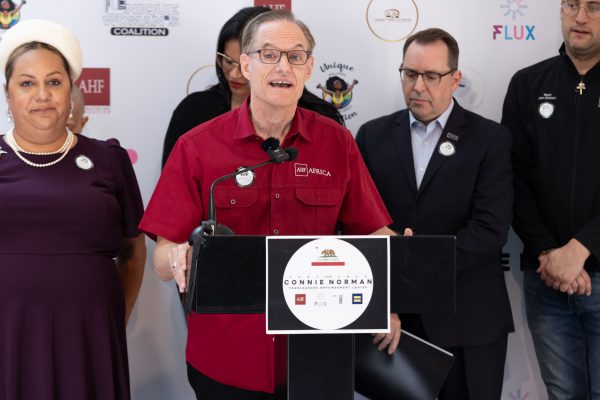
Michael Weinstein, president and CEO of AIDS Healthcare Foundation, the world’s largest and most influential AIDS Service organization, pointed out that around the world voting is a perilous adventure for LGB and particularly trans people. “AIDS Healthcare Foundation is in 47 countries around the world and in so many of those countries, the right to vote does not exist,” he said. “It turns my stomach to see on TV political ads targeting the trans community.” hightlighting the need for safe voting spaces like the CONOTEC.
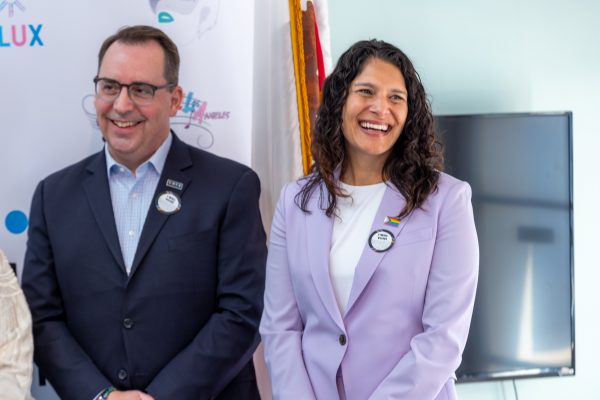
Kelley Robinson, president of the Human Rights Campaign, praised CONOTEC’s efforts to empower LGBTQ+ voters. “With our vote, each of us has the chance to write the next chapter of this nation’s story. And the nation’s story is incomplete without each one of us. When we show up, equality wins,” Robinson remarked, emphasizing the importance of collective civic participation.
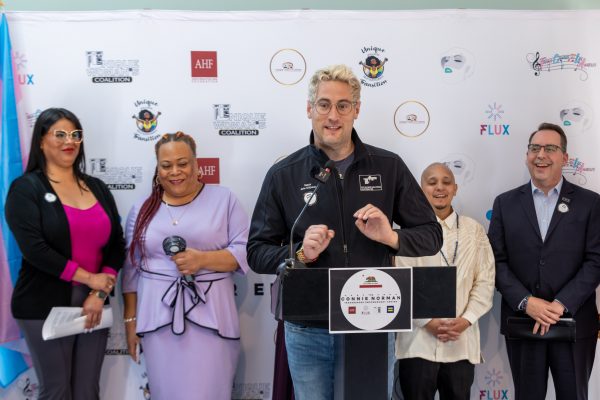
Features
The little idea that could: These queer, Latinx, DJs are shifting the scene in LA
‘All you jotas, grab your botas!’
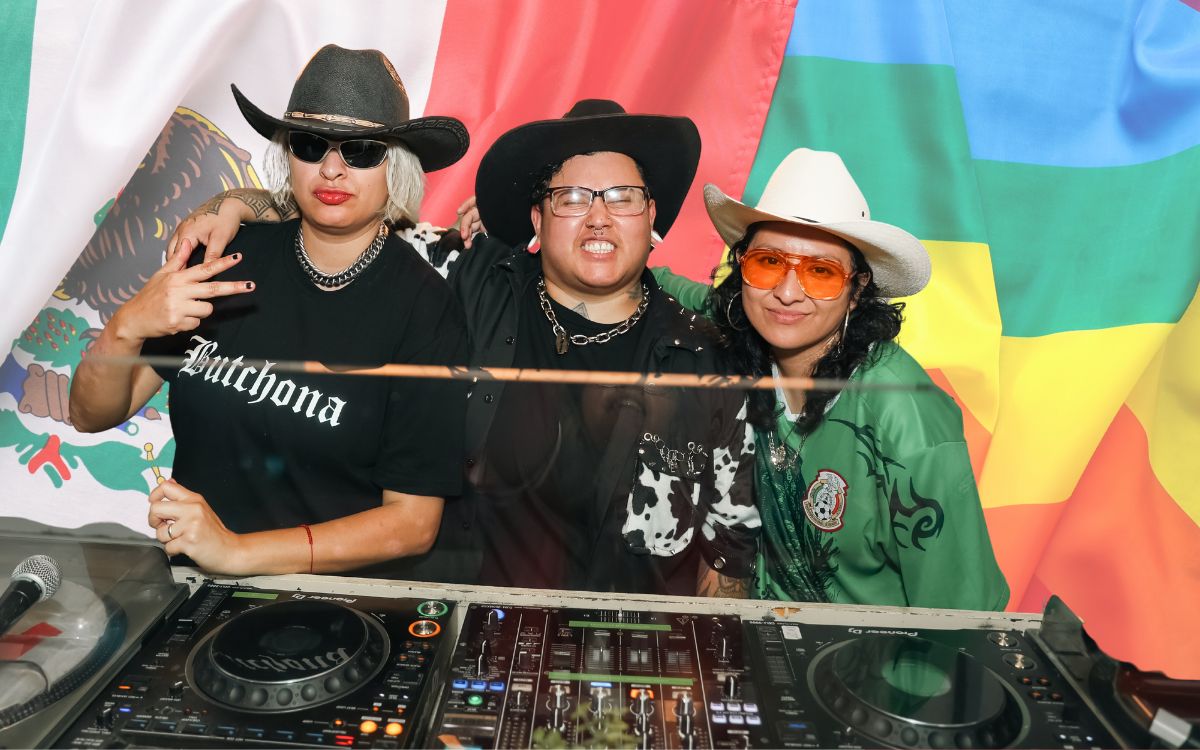
The rallying call urges all the Spanish-speaking and corrido-loving sapphics, butchonas, jotas and vaqueeras, to grab their boots and meet up at Little Joy Cocktails for a carne asada-style, family party every fourth Sunday of the month, featuring spins by DJ Lady Soul, DJ French and DJ Killed By Synth.
In Los Angeles, these three disc jockeys have embraced the word buchona, adding the ‘t’ as a play on the word butch.
The free event, now locally known as Butchona, is a safe space for all the Mexican and Spanish music-loving lesbians to gather on the last Sunday of every month.
Buchona is usually a term used in Mexico and other Spanish-speaking countries to describe a woman who is a boss– someone who exudes dominant energy or marries into a powerful position.
“I didn’t know how well [the idea for Butchona] was going to be received and my favorite part of all that, has been the looks everyone has been bringing,” said Rocio Flores, who goes by DJ Lady Soul.
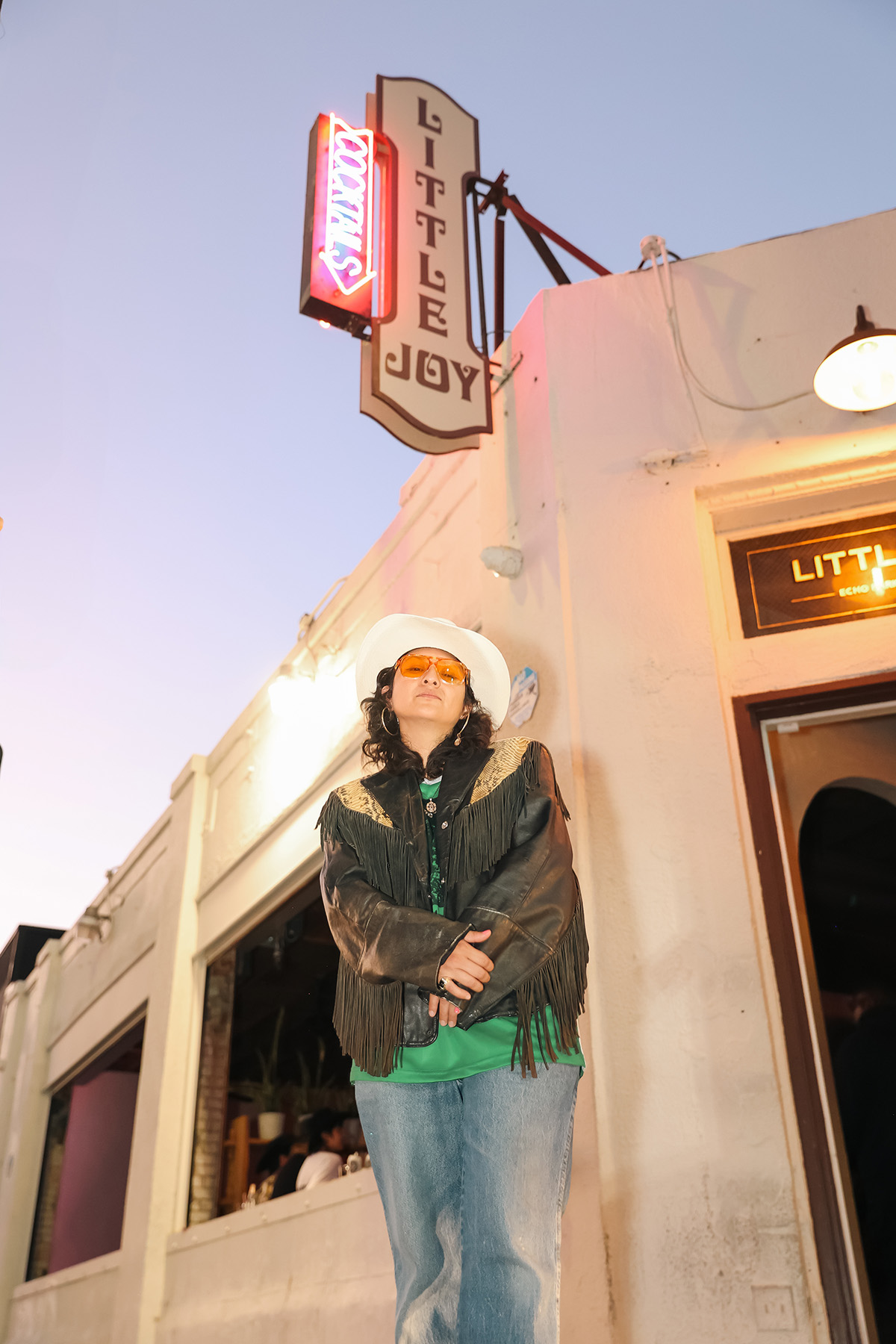
DJ Lady Soul poses outside of Little Joy Cocktails in her butchona outfit.
The event that started only a few months ago, brings in dozens of dressed-up jotas. The ‘looks’ that the crowds bring are reminiscent of how dad’s, tíos, and their friends dressed at Mexican family parties: a tejana, cowboy boots, giant belt buckle and a beer in hand.
Dressing up in these looks is a way to show wealth and status to earn the respect of other males in a male-dominated and -centered culture– that is until now.
This traditionally male, Mexican, cultural identity, is something that has never been embraced or accessible to women or gender non-conforming people. The giant belt buckles that are traditionally custom-made and specific to male identities like head of household, ‘only rooster in the chicken coop’ and lone wolf, are only part of the strictly cis-gendered male clothes that dominate the culture.
The embroidered button-ups, belt buckles and unique cowboy hats –all come together to create the masculine looks that are now being reclaimed by women and gender nonconforming people at the event curated by three queer, Mexican DJs, who once had a little idea that could.
Flores, 37, (she/her), Gemini, says that to her the term butchona describes a woman who is a little ‘chunti,’ a little cheap in the way she dresses– but in a queer way.
“That title also means that you’re a badass,” she said. “I want to look like that señor, I want to look like that dude and now I feel like I could, so why not?”
Flores says that now she feels like she can embrace and reclaim that cultural identity, but it wasn’t always that easy.
At first, her family upheld the traditional cisgender roles that forced her to dress more feminine, but she always wanted to dress like her cousins and her tíos.
“Now, I’m like: ‘Fuck that!’ I’m going to wear the chalecos and the Chalino suits,” she said in Span-glish.
The Chalino suits are traditional, Mexican, suits that were worn and popularized by Chalino Sanchez, known as the King of corridos—a genre of music that is said to have originated on the border region of Texas, Tamaulipas and Nuevo León, Mexico.
“It felt good to break into the DJ scene, but what I always noticed was that the lesbian culture was always lacking,” said DJ Lady Soul. “I would mainly see gay males at parties and a lot of male DJs.”
According to Zippia–a career site that sources their information from the U.S. Bureau of Labor and Statistics and the U.S. Census–23.5 percent of disc jockeys are women, 16 percent are LGBTQ+ and only 12.7 percent are Hispanic or Latin American.
What has always been a traditionally machista music genre and scene, is now being embraced by a growing number of queer women and non-male DJs in Los Angeles.
For Fran Fregoso, who goes by DJ French, 33, (they/she), Taurus– embracing their cultural identity came a lot easier because of their late uncle who sort of paved the way for them to come out as queer and be more accepted than he was as the first openly out queer person in their family.
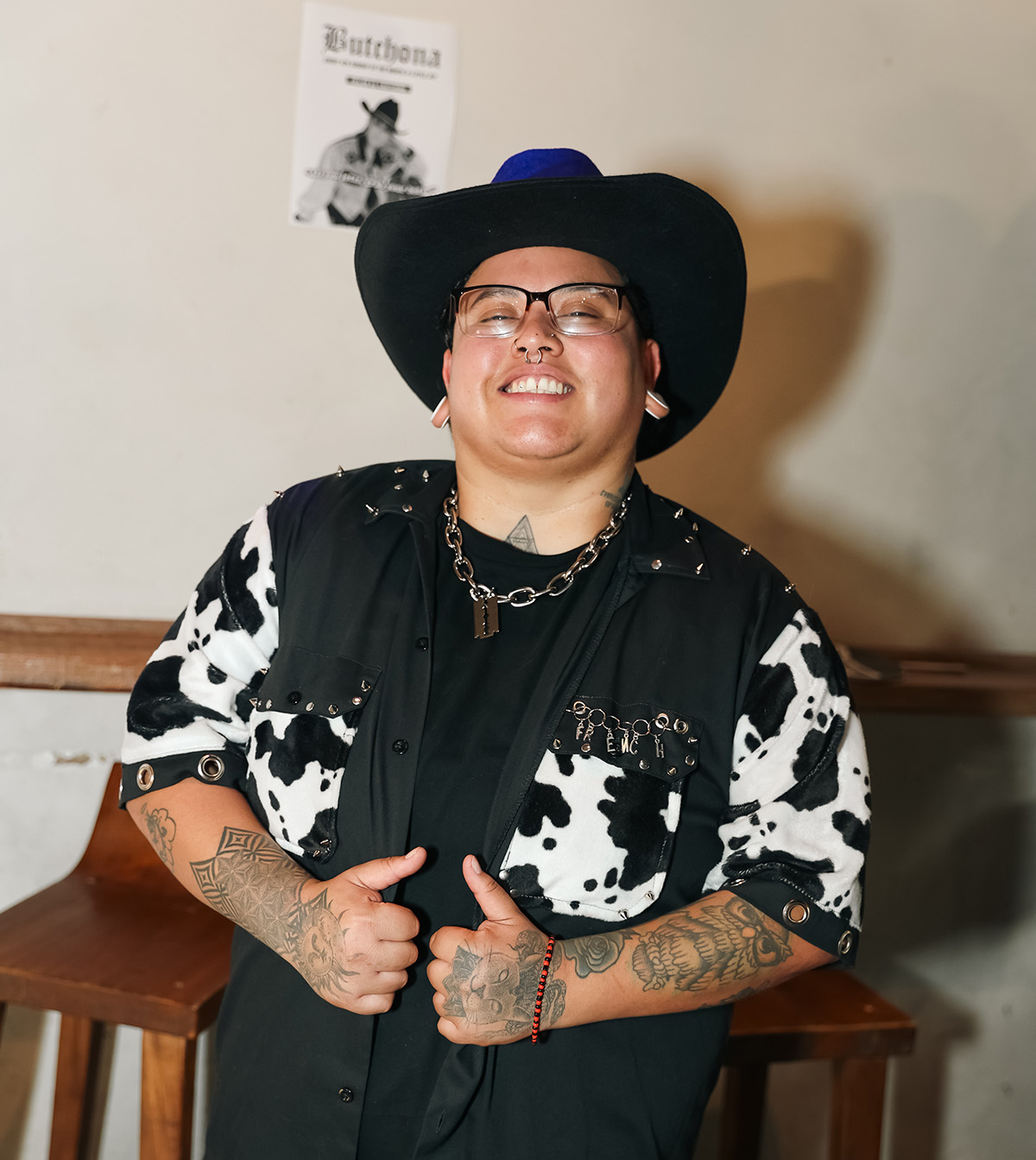
Their music journey began listening to the 90s grunge, alternative, hip-hop and metal music played by their older siblings at home.
“Then I met Vanessa [DJ Killed By Synth], and she introduced me to the industry,” said DJ French.
DJ French felt the acceptance and support to enter this music space and decided to embrace their cultural roots by playing music that they grew up listening to at family parties. They booked their first gig with Cumbiatón LA, a collective of DJs and organizers who host Latin American parties across Los Angeles, often centering queer DJs and other performers.
“When [Lady Soul and Killed By Synth], brought this idea up to create Butchona, I was like: ‘Oh, I’m in 100 percent’,” they said. “Because I love playing corridos and banda music because that’s a core memory from my childhood and family parties.”
Banda, corridos, cumbias and other traditional music is a big part of Mexican culture, even as gendered and male-centered as it has been, it is embraced by all.
“I know a lot of people in our queer, Latino, community love that music too, but they also want to be in a safe space,” they said. “That’s where we decided to make an environment for our community to dance and be themselves.”
Vanessa Bueno, 40, (she/her), Libra, who goes by DJ Killed By Synth, says her journey started about 20 years ago when she started DJing for backyard parties in East L.A. and across L.A. County.
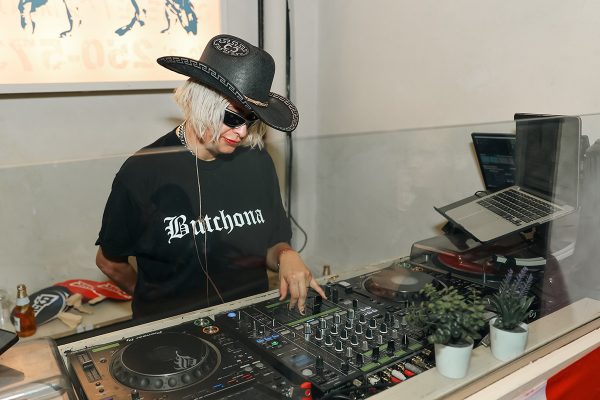
Her family is from Guadalajara, so she says that growing up she also had a lot of family parties with corridos and banda blaring in the background of memories with the many cousins she says she lost count of.
“A lot of the music we heard was bachata, banda, cumbia and even some 80s freestyle,” said Bueno.
Even while she had a ‘little punk rocker phase,’ she says she couldn’t escape that Spanish music her family played ritualistically at family get-togethers.
When they began their music journey–back in the AOL, Instant Messenger days, they played a lot more electronic music, hence the name Killed by Synth. At first, it was just a username, but then it became her DJ name.
“Later down the line, comes [the idea for] Butchona came about, and me, Rocio and French collaborated,” she said. “It’s kind of always been my goal to create these safe spaces for women and queer people, and I had been in the scene long enough to where people were willing to answer my calls to work with them to make it happen.”
For Bueno, it was natural for her to build community and embrace this part of their culture later on in her career when she saw a need for queer, Latin American-centered club spaces with family party vibes.
She started hosting Latin American-style parties, blending music, culture, and food and attracting the exact audience she envisioned. With these events, Bueno aimed to reclaim her Mexican identity and foster a sense of family and community at these events.
“We’re here to build a safe space to embrace the music and kind of not think about the machismo that is tied to it and celebrate who we are,” said Bueno.
According to the U.S. Department of Labor and Statistics, California, Texas, New York, Arizona and Washington rank the highest in employment rates for disc jockeys in 2023. There is also a recent trend in more women DJs–the study does not include gender nonconforming DJs–booking twice as many gigs as men in event spaces and concerts that host DJ sets.
“It feels like we’re barely cracking into these safe spaces and expanding our horizons a little bit,” said DJ French. “I hope this inspires other people to also create safe spaces like Butchona.”
The next Butchona event will be on Sunday, Oct. 27 and will feature all three DJs playing corridos, banda, cumbia and all the classics, for a chunti Halloween party.
Los Angeles
Urgent Prop 3 community town hall will feature discussion about marriage equality with local LGBTQ+ leaders
Join the conversation about safeguarding the freedom to marry for LGBTQ+ communities!
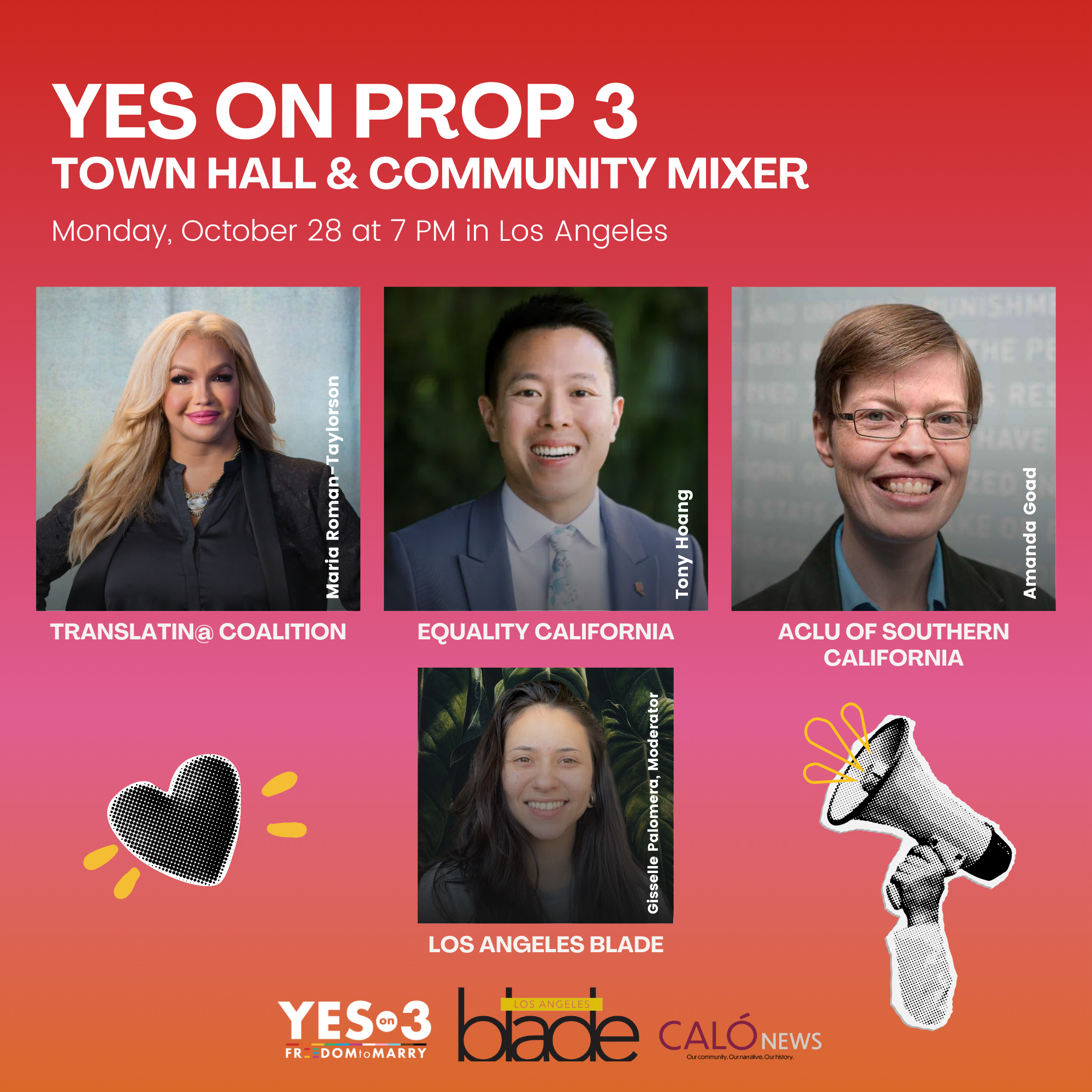
LGBTQ+ leaders will gather on Monday, Oct 28 at the historic St.Thomas the Apostle Church in Hollywood, for a community town hall and panel discussion in support of Proposition 3. The gathering will feature a panel with community leaders who will explain the importance of voting on this proposition, with a reception to follow the discussion.
The event is being hosted in collaboration with CALÓ News, a local nonprofit newsroom that covers Latinx issues across Los Angeles, and the Yes on Prop 3 campaign team. Los Angeles Blade will be using this opportunity to formally announce their new collaboration with CALÓ News with the addition of new Local News Editor, Gisselle Palomera.
The event begins at 7PM, starting with the town hall and panel discussion moderated by Palomera. Community leaders from the American Civil Liberties Union, Equality California, Trans Latin@ Coalition and the Gender and Reproductive Justice Project, will join Palomera on stage.
Proposition 3, also known as the Right to Marry and Repeal Proposition 8 Amendment and it aims to cement same-sex and interracial marriage equality in the California Costitution, which still only uses language that recognizes marriage can only be between a man and a woman.
To read more about Prop 3 ahead of the discussion, click here. To RSVP for the in-person community town hall event, click here.
California Politics
What you missed at the CD-14 debate between Ysabel Jurado and Kevin De León
LGBTQ+ candidate faces off against opponent Kevin De Leon on community forum on Wednesday
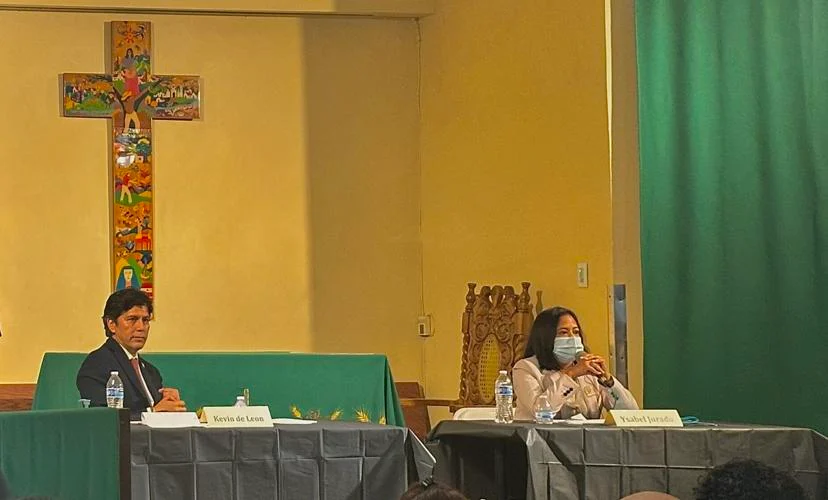
Los Angeles Council District 14 (CD-14) candidates Ysabel Jurado and Kevin de León sparred over their qualifications in what could have been their last in-person debate before the November election.
Wednesday’s CD-14 debate, a district home to approximately 265,000 people, 70% of them Latin American, offered the public a chance to hear from both candidates and their stand on issues such as homelessness, public safety and affordable housing, among other things.
CALÓ News was one of the media outlets that were present inside Dolores Mission Catholic Church in Boyle Heights, where the debate was held. Below are our reporter’s main takeaways.
People showed up and showed out. More than 300 people attended the debate, which was organized by Boyle Heights Beat and Proyecto Pastoral. More than 260 people gathered inside the church and the rest watched via a livestream projected on the church’s patio.
The debate was bilingual, with translation services available for all, honoring the many Spanish speakers that live in the district, as Brendan P. Busse, pastor of the church, said in the opening statement.
As part of the event guidelines, Busse also shared that no applause or booing was to be permitted, a rule that was broken within the first ten minutes of the forum. “Where you are tonight is a sacred place. People who are in need of shelter sleep here and have for the last 40 years,” he said when referring to the church transforming into a homeless shelter at night for over 30 adults. “Power and peace can live in the same place.”
That was the most peaceful and serene moment throughout the two-hour forum.
What followed was traded insults and competing visions from both candidates.
One of the first stabs occurred when De León accused Jurado of wanting to “abolish the police” and when Jurado reminded the public of De Leon’s “racist rhetoric,” referring to the 2022 scandal over the secretly recorded conversation with Gil Cedillo and Nury Martínez where they talked about indigenous Mexicans, Oaxacans, the Black and LGBTQ+ communities and councilman Mike Bonin’s adopted son.
“I made a mistake, and I took responsibility. I have been apologizing for two years,” De León said. “Just as in the traditions of the Jesuits, love, reconciliation [and] peace, one must choose if we are going to be clinging to the past or move forward. I choose to move forward.”
When Jurado was asked about her stance on police, she said she had never said she wanted to abolish the police. “Don’t put words in my mouth,” she told De León. “I have never said that,” she said. “We put so much money into public safety into the LAPD yet street business owners and residents in these communities do not feel safer. The safest cities invest in communities, in recreation and parks, in libraries [and] youth development.”
De León and Jurado also discussed their plan to work with the homeless population, specifically during the 2028 Olympic and Paralympic Games in Los Angeles. In Los Angeles County, an estimated 75,312 people were experiencing homelessness, as stated in the 2024 homeless count. For CD-14 the issue of homelessness takes a higher level as it is home to Skid Row, which has one of the largest homeless populations in the U.S.
“We should continue to house our unhoused,” De León said.
He followed this by saying that under his leadership, CD-14 has built the most interim housing than “in any other place in the entire city of L.A.” He made a reference to the Boyle Heights Tiny Home Village and 1904 Bailey, both housing projects in CD-14.
“We need safety when the Olympics come,” he added.
Jurado said De León’s leadership has fallen short in his years in office, specifically when it comes to the homeless population and said that housing like the tiny homes is not sufficient for people in the district to live comfortably.
“My opponent has governed this district, Skid Row, for over 20 years. Has homelessness in this district gotten better? We can all agree that it hasn’t,” she said. “County Supervisor Hilda Solís put up 200 units that are not just sheds; they have bathrooms, they have places and they have support services. Why hasn’t [CD-14] gotten something better than these tiny homes?”
One of De León’s repeating arguments in various of his answers was the fact that Jurado has never held public office before. “I’ve dedicated my whole life to public service, to the benefit of our people. My opponent, to this day, has not done one single thing,” De León said in the first few minutes of the debate.
In one of the questions about low-income elders in the district, he listed some of his achievements when helping this population, including bringing free vaccines for pets of seniors of this district and food distributions, which, as De León noted, help people with basic food needs, including beans, rice and chicken. “The same chicken sold in Whole Foods,” he said.
Jurado defended herself against the reality of never holding public office and said her work as a housing rights attorney and affordable housing activist have given her the tools and experience to lead the district in a different direction than the incumbent, De León. “We can’t keep doing the same thing and expect different results,” Jurado said. ‘We need long-term solutions,” she said.
Last month, The L.A. Times also reported on Jurado’s past political experience, including working on John Choi’s unsuccessful 2013 run for City Council, as well as her work as a scheduler in Mayor Eric Garcetti’s office and how she was appointed by Garcetti to the Human Relations Commission in 2021.
She later added that she was proud to already have the support of some of the L.A. City Council members, such as Eunisses Hernández, Nithya Raman and Hugo Soto-Martínez, which De León later referred to as the “socialist council members.”
After the debate, CALÓ News talked to both candidates and asked how they thought the debate went.
“It was a spirited debate, no question about it,” De León said. “Sometimes elections can take a real ugly twist that is very similar to Trump-ian characteristics. Like Donald Trump just says whatever he wants to say, no matter how outlandish [or] inaccurate it is.”
When asked the same question, Jurado said, “ I think my opponent said a bunch of lies and said that he has plans for this district when he’s had four years to execute all of them. It’s really disappointing that only now he suddenly has all these ideas and plans for this district.”
Both candidates told CALÓ News they will continue working until election day and making sure CD-14 residents show up to vote.
“But I think past the debate[s], it’s just [about] keeping your nose to [the] grindstone, working hard, and taking nothing for granted, knocking on those doors and talking directly to voters,” De León said.
Jurado said she still has a couple other events that she and her team are hosting before election day. “I’m out here talking to voters. We want to make sure that people know who I am and that they have other options. People are disappointed. We’re going to keep folks engaged and make sure that [they] turn out to the polls,” she said.
Jorge Ramírez, 63, from Lincoln Heights, said he has been supporting De León since his time in the State Senate and said he will continue to vote for him because he doesn’t know much about his opponent. “He is the type of person we need. He’s done a lot for immigrants,” he said. “The other person, we don’t know much about her and she’s not very well known. She doesn’t have much experience in this field.”
Alejandra Sánchez, whose daughter goes to school in Boyle Heights and lives in El Sereno, said she believes CD-14 has been in desperate need of new leadership and worries that many people will vote for De Leon just because he is who they have known for so long. “It’s very powerful to see a woman leader step in… It’s been an incredible year to see a woman president elected in Mexico, a woman running for president in the U.S. and a woman also running for leadership here in our community,’ she said. “That’s part of the problem… we are afraid to think about something new, about the new leadership of someone doing things differently.”
General election day will take place on Tuesday, November 5, 2024. Early voting began on October 7. You can register to vote or check your registration status online on the California Online Voter Registration page.
AIDS and HIV
40th anniversary AIDS Walk happening this weekend in West Hollywood
AIDS Project Los Angeles Health will gather in West Hollywood Park to kick off 40th anniversary celebration
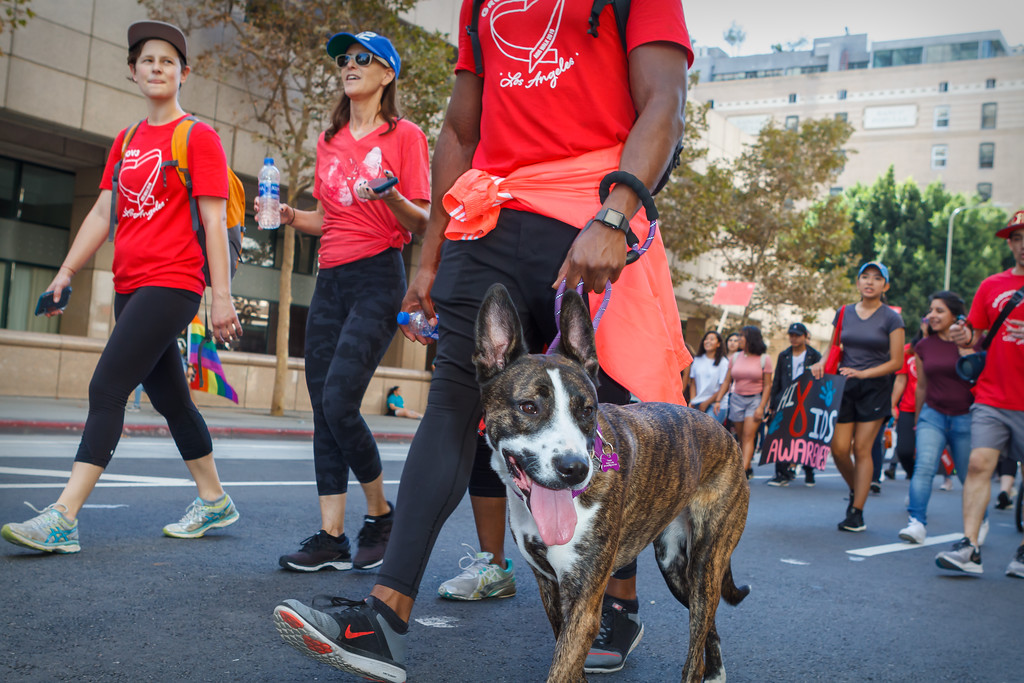
APLA Health will celebrate its 40th anniversary this Sunday at West Hollywood Park, by kicking off the world’s first and oldest AIDS walk with a special appearance by Salina Estitties, live entertainment, and speeches.
APLA Health, which was formerly known as AIDS Project Los Angeles, serves the underserved LGBTQ+ communities of Los Angeles by providing them with resources.
“We are steadfast in our efforts to end the HIV epidemic in our lifetime. Through the use of tools like PrEP and PEP, the science of ‘undetectable equals intransmissible,’ and our working to ensure broad access to LGTBQ+ empowering healthcare, we can make a real step forward in the fight to end this disease,” said APLA Health’s chief executive officer, Craig E. Thompson.
For 40 years, APLA Health has spearheaded programs, facilitated healthcare check-ups and provided other essential services to nearly 20,000 members of the LGBTQ+ community annually in Los Angeles, regardless of their ability to pay.
APLA Health provides LGBTQ+ primary care, dental care, behavioral healthcare, HIV specialty care, and other support services for housing and nutritional needs.
The AIDS Walk will begin at 10AM and registrations are open for teams and solo walkers. More information can be found on the APLA Health’s website.
-
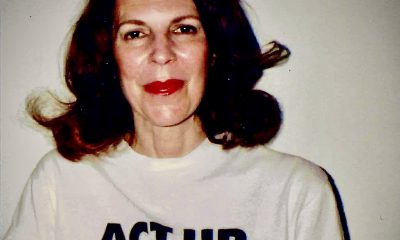
 Obituary3 days ago
Obituary3 days agoNanette Kazaoka, an unlikely AIDS activist, dies at 83
-
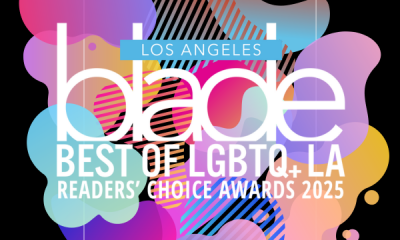
 Arts & Entertainment47 minutes ago
Arts & Entertainment47 minutes ago2025 Best of LGBTQ LA Readers’ Choice Award Nominations
-
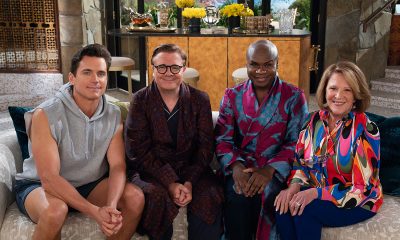
 Television4 days ago
Television4 days agoNo, ‘Mid-Century Modern’ is not a ‘Golden Girls’ remake
-

 Local4 hours ago
Local4 hours ago‘Think of those who have not been seen,’ Cynthia Erivo’s powerful message at GLAAD Awards
-

 Features2 hours ago
Features2 hours agoTristan Schukraft: Keeping Our Queer Spaces Thriving
-
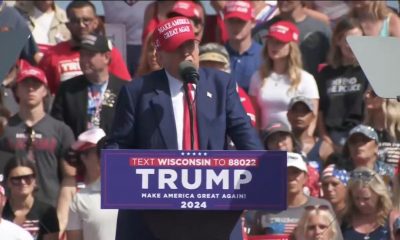
 Opinions1 hour ago
Opinions1 hour agoGay bar in California bans MAGA gear — but no other political expression — from its premises

